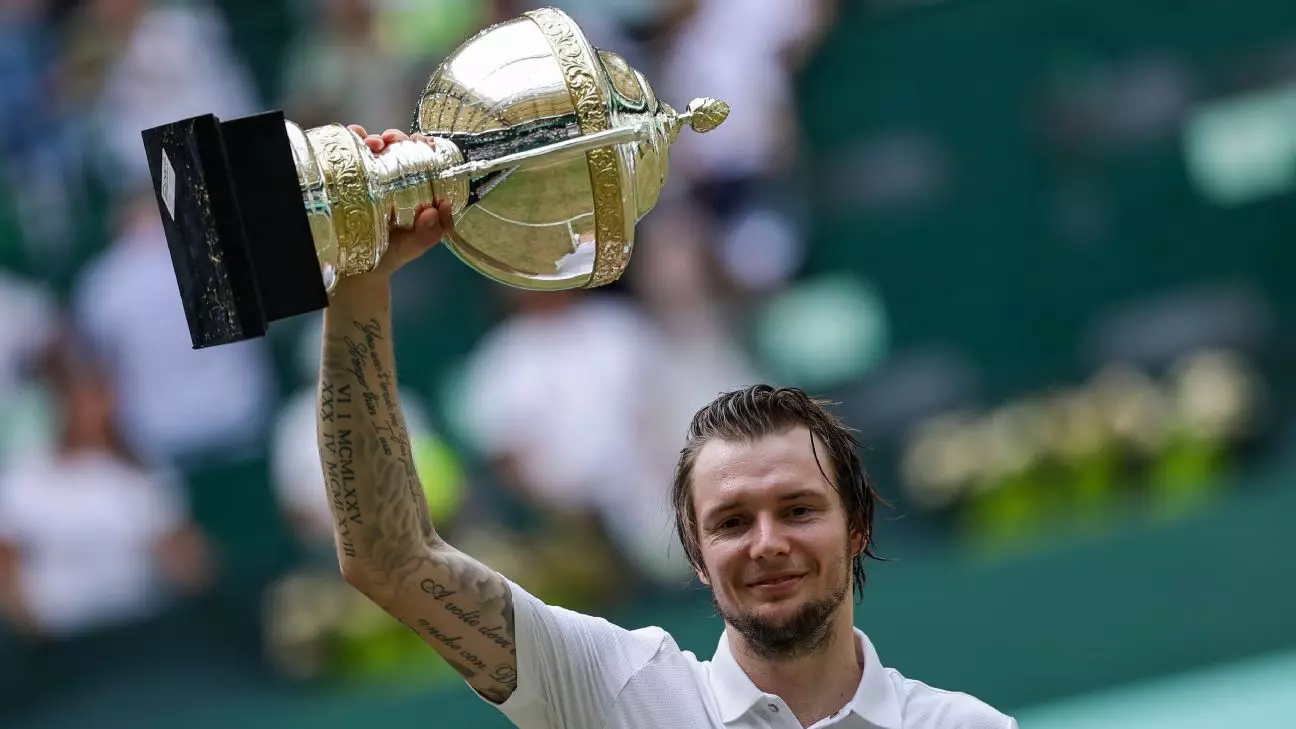The Halle Open witnessed a captivating showdown as Alexander Bublik surged to victory against Daniil Medvedev with a scoreline of 6-3, 7-6 (4). This triumph marks a significant milestone for the Kazakhstani player, illustrating not merely a win but a breaking of a longstanding barrier. Prior to this match, Bublik had faced Medvedev six times without securing a victory, illustrating the mental fortitude required to overcome an opponent who had consistently outperformed him.
It’s fascinating how pressure often reveals the true mettle of an athlete. Bublik, known for his unconventional playing style, has previously struggled against Medvedev’s relentless consistency. Yet, on this crucial day, he displayed an uplifting mix of confidence and tactical prowess, establishing his foothold in the match almost immediately. Winning against a player like Medvedev—a formidable competitor with a reputation for tenacity—profoundly shifts the dynamic of their rivalry and can be a turning point in Bublik’s career.
Bublik’s Resilience on Display
The first set was a masterclass in composure, with Bublik showcasing his extraordinary talent. A particular highlight came from a remarkable 12-point winning streak, highlighting his impressive momentum and ability to capitalize on opportunities. However, the second set presented a different narrative as he struggled with five double-faults, a testament to the inherent pressure of nearing victory against a seasoned opponent like Medvedev.
What becomes essential to note here is how athletes manage their mental game amid rising stakes. Medvedev, having seen off home favorite Alexander Zverev in the semifinals, was arguably carrying both the weight of expectation and experience. Yet Bublik remained undeterred, demonstrating that in sports, the results can often ascend from a wellspring of courage and resilience, even when doubt lurks around the corner.
A Characteristic Gesture of Sportsmanship
In a heartfelt acknowledgment, Bublik offered kind words to Medvedev post-match, remarking, “Daniil, I’ve been cursed to play you forever and never won a set in my life, but today I’m happy to get through… I wish you a lot of success.” Such displays of sportsmanship are refreshing, especially in high-stakes matches where emotions can run high. It reflects a level of respect that’s crucial in cultivating a positive sports culture, emphasizing that while competition is fierce, camaraderie should not be overshadowed.
Bublik’s victory established him as only the third player to win the Halle Open multiple times—joining the illustrious ranks of Yevgeny Kafelnikov and Roger Federer, both titans of the sport. This win further signals the evolving landscape of men’s tennis, where fresh talents are beginning to shine, and established players face acute challenges from the rising generation.
Future Implications for Both Players
While Bublik basks in the afterglow of this important victory, Medvedev’s reflections reveal a poignant blend of optimism and frustration. “A better week, maybe, than we expected but not the best feeling in the end,” he mused. This sentiment encapsulates the dual nature of sporting journeys—where defeats can spawn as much growth as victories, paving the way for resilience and enhanced performance in future competitions.
Both athletes, with their contrasting styles and approaches, are prime examples of how varied the road to success can be in the world of tennis. As the sport continues to evolve, their legacies will serve as potent reminders of the unpredictable and thrilling nature of competition at this elite level.

